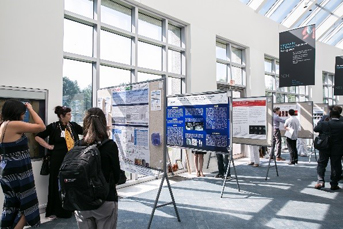NICHD成立于1962年,是美国国立卫生研究院(NIH)的27个研究所和中心之一。由国家卫生发展局局长办公室、校外研究部、校外研究部和国家医学康复研究中心组成,它们的名称、功能、、职责如下:
国家卫生发展局局长办公室(NICHD OD)
NICHD OD为研究所的研究计划和活动提供整体领导,规划,指导,协调和评估。OD还制定内部政策和程序,并监督其实施和维护。此外,NICHD OD还领导该研究所在评估和向科学界,临床从业者和公众传播信息方面的努力。
在国家卫生发展局局长办公室下,又有八个部门来进行分工合作。分别是:行政管理办公室、通讯处、数据科学与共享办公室、全球卫生办公室、卫生公平办公室、委员会管理处和道德操守处。
校外研究部(DER)
DER在NICHD的使命范围内开发,实施和协调跨领域的多学科研究活动。研究组合相当广泛,包括与受孕和怀孕,儿童期正常和异常发育,生殖健康和整个生命周期的人口动态相关的生物学,行为学和临床研究。NICHD的校内研究部门在NIH开展实验室和临床研究计划,而DER通过赠款和合同协调和资助美国和许多其他国家的研究和培训计划。
DER就校外研究和培训政策及活动向NICHD主任提供建议。它还为每年大约3,500个竞争性赠款申请和450多个新的和竞争性的奖项提供科学同行评审,赠款管理以及项目管理和监督。DER以科学优先事项和研究诚信为重点,领导NICHD的校外政策和程序的实施。
校外研究部(DIR)
由大约62个单位和部分组成的13个亲和小组以及人口健康研究司组成了DIR。
DIR的使命是规划和开展研究所的实验室和临床研究计划,通过基础,临床和基于人群的研究来寻求有关生命系统性质和行为的基本知识,并确定如何应用这些知识来阐明健康和疾病的发育起源,并帮助确保女性和男性具有良好的生殖健康, 儿童生来健康,人们发展到过上健康和富有成效的生活。
DIR开展实验室,临床,流行病学和统计研究计划,通过基础,临床和基于人群的研究来寻求有关生命系统性质和行为的基础知识。DIR利用这些知识来阐明健康和疾病的发育起源,并帮助确保妇女和男子具有良好的生殖健康,儿童出生健康,人们发展到过上富有成效的生活。研究工作的重点是获取信息,这些信息将增强DIR对发育和繁殖生物学的理解。DIR的研究计划强调对细胞的物理,化学和生物学,其组成部分以及控制和调节其功能的过程进行基础研究的重要性。作为其调查重点的一部分,DIR的科研人员高度重视向后代科学家传递新信息。
国家医学康复研究中心(NCMRR)
通过基础,转化和临床研究,NCMRR旨在促进提高身体残疾人的健康,生产力,独立性和生活质量所需的科学知识的发展。
NCMRR支持以下主题的研究:慢性损伤神经和肌肉骨骼系统(包括中风,创伤性脑损伤,脊髓损伤和骨科疾病)的病理生理学和管理;运动和认知功能的修复和恢复;功能性可塑性、适应性和康复干预的机会之窗;涉及药物,刺激,神经工程方法,运动,运动训练和行为改变的康复策略;儿科康复;与慢性残疾相关的继发性疾病;改善诊断、评估和结局指标;以及矫形器,假肢和其他辅助技术和设备的开发。
该中心的国家医疗康复研究咨询委员会每年举行两次会议,讨论NCMRR的投资组合和研究方向。部分会议向公众开放,会议记录和其他相关信息可供使用。
NCMRR还领导了NIH康复研究计划(PDF 1.5 MB)的制定,用于整个NIH的医疗康复研究的开展,支持和协调。

Founded in 1962, NICHD is one of 27 institutes and centers at the National Institutes of Health (NIH). It is composed of the Office of the Director General of the National Health Development Bureau, the Department of External Research, the Department of External Research and the National Medical Rehabilitation Research Center, and their names, functions, and responsibilities are as follows:
Office of the Director General of the National Health Development Agency (NICHD OD)
NICHD OD provides overall leadership, planning, guidance, coordination and evaluation of the Institute's research programs and activities. OD also develops internal policies and procedures and oversees their implementation and maintenance.In addition, NICHD OD leads the Institute's efforts to evaluate and disseminate information to the scientific community, clinical practitioners and the public.
Under the Office of the Director General of the National Health Development Bureau, there are eight more departments to work together. They are: Office of Administration, Office of Communications, Office of Data Science and Sharing, Office of Global Health, Office of Health Equity, Office of Commission Management and Office of Ethics.
Department of External Research (DER)
DER develops, implements and coordinates multidisciplinary research activities across disciplines within the mission of NICHD. The research portfolio is quite broad and includes biological, behavioral, and clinical studies related to conception and pregnancy, normal and abnormal development in childhood, reproductive health, and population dynamics throughout the life cycle. NICHD's on-campus research arm conducts laboratory and clinical research programs at NIH, while DER coordinates and funds research and training programs in the United States and many other countries through grants and contracts.
DER advises NICHD directors on off-campus research and training policies and activities. It also provides scientific peer review, grant administration, and project management and oversight for approximately 3,500 competing grant applications and more than 450 new and competitive awards each year. With a focus on scientific priorities and research integrity, DER leads the implementation of NICHD's off-campus policies and procedures.
Department of External Research (DIR)
The DIR is composed of 13 affinity groups consisting of approximately 62 units and sections and the Population Health Research Division.
DIR's mission is to plan and conduct the Institute's laboratory and clinical research programs to seek basic knowledge about the nature and behavior of living systems through basic, clinical, and population-based research, and to determine how to apply this knowledge to elucidate the developmental origins of health and disease, and to help ensure that women and men have good reproductive health, that children are born healthy, and that people develop to live healthy and productive lives.
DIR conducts laboratory, clinical, epidemiological and statistical research programs that seek fundamental knowledge about the nature and behavior of living systems through basic, clinical, and population-based research. DIR uses this knowledge to elucidate the developmental origins of health and disease and to help ensure that women and men have good reproductive health, children are born healthy, and people develop to live productive lives. The focus of research efforts is on obtaining information that will enhance DIR's understanding of developmental and reproductive biology. DIR's research program emphasizes the importance of fundamental research into the physics, chemistry and biology of cells, their components, and the processes that control and regulate their function. As part of its investigative focus, DIR's researchers place a high priority on delivering new messages to future generations of scientists.
National Center for Medical Rehabilitation Research (NCMRR)
Through foundational, translational, and clinical research, NCMRR aims to promote the development of the scientific knowledge needed to improve the health, productivity, independence, and quality of life of people with physical disabilities.
NCMRR supports research on the pathophysiology and management of chronic injury of the nervous and musculoskeletal systems, including stroke, traumatic brain injury, spinal cord injury and orthopedic diseases; Repair and restoration of motor and cognitive function; windows of opportunity for functional plasticity, adaptability and rehabilitation interventions; Rehabilitation strategies involving drugs, stimuli, neuroengineering methods, exercise, athletic training and behavioural change; Pediatric rehabilitation; Secondary diseases associated with chronic disability; improving diagnostic, assessment and outcome indicators; and the development of orthoses, prostheses and other assistive technologies and devices.
The Center's National Advisory Committee on Medical Rehabilitation Research meets twice a year to discuss NCMRR's portfolio and research directions. Some meetings are open to the public and minutes and other relevant information are available.
NCMRR also led the development of the NIH Rehabilitation Research Program (PDF 1.5 MB) for the development, support, and coordination of medical rehabilitation research throughout the NIH.